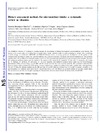Identificador persistente para citar o vincular este elemento:
https://accedacris.ulpgc.es/jspui/handle/10553/44741
| Título: | Dietary assessment methods for micronutrient intake: a systematic review on vitamins | Autores/as: | Henríquez Sánchez, Patricia Sánchez-Villegas, Almudena Doreste-Alonso, Jorge Ortiz-Andrellucchi, Adriana Pfrimer, Karina Serra-Majem, Lluis |
Clasificación UNESCO: | 3206 Ciencias de la nutrición | Palabras clave: | Dietary Assessment FFQ Validation Vitamins |
Fecha de publicación: | 2009 | Publicación seriada: | British Journal of Nutrition | Resumen: | The EURRECA Network of Excellence is working towards the development of aligned micronutrient recommendations across Europe. The purpose of the present study was to define how to identify dietary intake validation studies in adults pertaining to vitamins. After establishing a search strategy, we conducted a MEDLINE and EMBASE literature review. A scoring system was developed to rate the quality of each validation study according to sample size, statistical methods, data collection procedure, seasonality and vitamin supplement use. This produced a quality index with possible scores obtained ranging from 0.5 to 7. Five thousand four-hundred and seventy-six papers were identified. The numbers meeting the inclusion criteria were: for vitamin A, 76; vitamin C, 108; vitamin D, 21; vitamin E, 75; folic acid, 47; vitamin B12, 19; vitamin B6, 21; thiamine, 49; riboflavin, 49; and niacin, 32. The most frequently used method to ascertain dietary intake was the Food Frequency Questionnaire (FFQ), whereas dietary records (DR) and 24-h recalls were the most used reference methods. The correlation coefficients (CC) between vitamin intakes estimated by FFQ and the reference method were weighted according to the study's quality index and ranged from 0.41 to 0.53 when the reference method was the DR and from 0.43 to 0.67 when the reference was 24-h recalls. A minority of studies (n 33) used biomarkers for validation and in these the CC ranged from 0.26 to 0.38. The FFQ is an acceptable method of assessing vitamin intake. The present review provides new insights regarding the characteristics that assessment methods for dietary intake should fulfil. | URI: | https://accedacris.ulpgc.es/handle/10553/44741 | ISSN: | 0007-1145 | DOI: | 10.1017/S0007114509993126 | Fuente: | British Journal of Nutrition [ISSN 0007-1145], v. 102 (sup. 1), p. S10-S37, (Diciembre 2009) |
| Colección: | Artículos |
Citas SCOPUSTM
88
actualizado el 08-jun-2025
Citas de WEB OF SCIENCETM
Citations
85
actualizado el 08-feb-2026
Visitas
53
actualizado el 10-ene-2026
Descargas
123
actualizado el 10-ene-2026
Google ScholarTM
Verifica
Altmetric
Comparte
Exporta metadatos
Los elementos en ULPGC accedaCRIS están protegidos por derechos de autor con todos los derechos reservados, a menos que se indique lo contrario.
